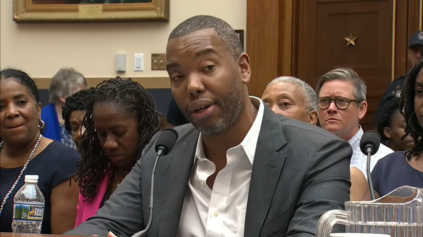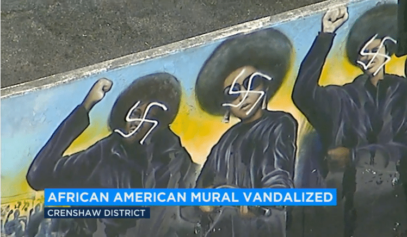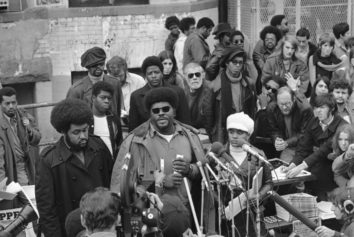Paul Coates never planned to become a member of the Black Panther Party. Recently returned from a three-year military stint in Vietnam, the Philadelphia native and avid reader relocated to Baltimore in 1968, where he subsequently began “hanging around” the Party, not as a member, but as a community worker.
“At that time,” Coates clarifies, “you didn’t join the Party. The Party joined you.”
Paul Coates certainly never planned to become a leader in the Black Panther Party. After the Baltimore chapter was “wiped out” by politically motivated arrests and its members forced into hiding, Coates, still a community worker, traveled to New York to let the Party’s East Coast leadership know of the precarious local situation. Upon informing them there was “nobody left in Baltimore” outside of himself and a few other community workers, he recalls, “one brother said, ‘Well I put you in charge.’” Caught off guard, Coates quickly responded that he had no desire to do so. The Panther leader persisted, and the two went back and forth until Coates protested, “I can’t be in charge. I am not even a Panther!”
The response he received would settle the debate once and for all.
“Well, you a motherf—in’ Panther now!”
What Paul Coates actually did plan to do was support those in his community while informing and educating them about their global culture, unparalleled accomplishments and rich history.
Arguably—along with his longtime friend and fellow publisher, Haki Madhubuti, of the half-century-old Third World Press—he has done this as well as any man alive.
Less than a year from now, Coates’ world-renowned publishing company, Black Classic Press, will celebrate 40 years of educating and serving the African diaspora through the written word. Since 1978, the company has devoted itself to publishing obscure and significant works by and about people of African descent while specializing in the republishing of important out-of-print books.
If not for Black Classic Press, the largely inaccessible works of such late luminaries as Drusilla Dunjee Houston and Dr. Yosef ben Jochannan — more affectionately known as “Dr. Ben” — may have been relegated to the dustbins of world history. Along with Houston and Dr. Ben, Black Classic Press has played a prominent role in the ongoing circulation of such deceased historians, scribes and intellectuals as John Henrik Clarke, Gerald Massey, John G. Jackson, J.A. Rogers and Carter G. Woodson, to name a few.
“These works formed a foundation of knowledge that our ancestors had left for us and that knowledge had to be carried forward,” insists Coates, noting “that was to be the purpose of Black Classic Press.”
“Paul has always been someone who cares about Black people more than Black people care about themselves,” says longtime friend, colleague and popular cultural historian Anthony Browder. “What Paul has done is specifically giving voice to ancestors whose historical record should never be forgotten.”
Describing Coates as “the big brother I never had,” Browder feels the press is even more relevant today given the tumultuous racial times we currently find ourselves in. “Many of the classics that Paul has made available to us will be the very material required for people of African ancestry to shift our consciousness and develop a more dynamic and meaningful relationship with this country,” Browder contends. “Knowledge is power, and Brother Paul has been our custodian to the storehouse of knowledge to make sure we have the scholarly writing accessible that will truly make us into the people we are destined to become.”
Concerning Coates’ destiny, while he certainly had a strong vision in the early ’70s of how to best support and educate his beloved community, it was never his plan to be successful at it, at least not in the traditional commercial sense.
“I never thought about the press as a business,” says Coates, explaining it was “more oriented as a social program” where revenues, similar to the Black Panther Party approach, were used to “support inmates and their families, give away food and help people pay their bills and stay in their houses.”
Upon leaving a restructured Panther party to focus more energy on assisting local comrades still incarcerated, Coates helped forge the George Jackson Prison Movement in 1972 as a means of connecting inmates with a supportive and functional network on the outside.
“What I envisioned through this movement was working with brothers who were incarcerated, bringing them out and having them work in our first program, which was to be a bookstore,” Coates says, describing it as a way for them to “contribute to our community some of the goodness that got shaped while organizing with the comrades in jail.” The idea was to then build a progressive publishing house and, subsequently, a printing house that would all work together in a symbiotic relationship with the bookstore, providing knowledge, employment, revenue and a supportive exchange between those in and out of the jail. “This is where Black Classic Press was founded,” says Coates, explaining the vision, largely inspired by the prison-based educations of Malcolm X and George Jackson, and by a literary call from Madhubuti stressing the need for Black publishing. “It didn’t have a name yet, but it was founded inside the George Jackson Prison Movement.”
As a first step, Coates and another former Panther set up the bookstore in 1973. After his colleague moved on, Coates then built the publishing house, officially established in 1978. In the process, he forged close relationships with such advice-bearing luminaries as Clarke, Jackson and Dr. Ben. One of Coates’ children Ta-Nehisi Coates — a world-renowned writer, National Book Award winner and MacArthur Foundation “Genius Grant” Fellow — was named at birth by Dr. Ben in 1975. Coates stresses the impact of such relationships as he credits these elders with inspiring and supporting the press, and how its very existence will always be “informed by the examples of these three giants.”
“They were very good uncles and fathers to me,” Coates acknowledges.
Two decades later, while still employing and educating former inmates and the community, the third jewel of Coates’ vision was completed upon the 1995 launch of his on-demand printing company, BCP Digital. And given his longtime admiration for those visionaries before him who were active in both publishing and printing — Houston, Frederick Douglass, Martin Delany, Julian Richardson — Coates considers BCP Digital to be his crown jewel. “To do this in my generation is like emulating the elders while also creating what should be,” he says, “and that is an engine for us to fund ourselves and our own vision of community.”
About the same time, another key relationship was forged as he began working with, and befriending bestselling author Walter Mosley, who had let it be known he wanted “an independent press to publish one of his books.” It was the beginning of a strong and productive relationship, one of great sustenance for the press and one that lasts to this day. “Walter was already a very successful writer before he hooked up with me,” says Coates, who includes Mosley among his closest friends. He describes the bestselling author’s desire to work with a small independent Black press as “unparalleled” explaining that Mosley insisted Coates have the publishing rights to his critically acclaimed book, Gone Fishing, because “a Black press needs to know how to do this.”
“I have truly been blessed by the ancestors to have around me, at every stage, good people that had my back long enough so I could catch my breath and keep stroking,” Coates says.
Others feel the same about him. “He has always provided support for me,” says colleague Troy Johnson, owner of aalbc.com (African American Literature Book Club), the oldest, largest and most frequently visited website for books by or about people of African descent. Johnson says that even before his site became popular, Coates recognized “what I was trying to do and told me why it was important. Up until this day, when I talk to him, he still offers a great deal of motivation and reminds me why it matters.”
Citing his advancing age, what now matters to Coates is preparing to pass off his extraordinary publishing legacy to younger hands who can keep the company relevant and viable to the African-American community for another four decades.
“I take being an elder very seriously and an elder’s role is that of an advisor,” says Coates, noting “it’s appropriate for folks to get out of the way of those who are younger and can lead the charge forward.”
Accordingly, the former Black Panther who has devoted his life to educating others does not plan to helm one of the most important institutions in Black America deep into its fifth decade.
Then again, if history is any indicator, there’s no telling what might happen when Paul Coates doesn’t plan on it.


